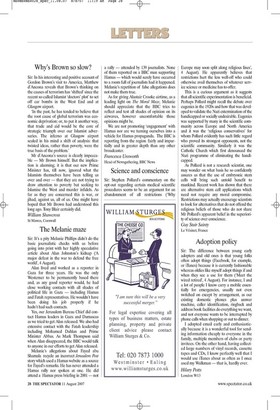Science and conscience Sir: Stephen Pollard's commentary on the opt-out
regarding certain medical scientific procedures seems to be an argument for an abandonment of all restrictions ('Why Europe may soon split along religious lines', 4 August). He apparently believes that restrictions hurt the less well-off who could otherwise avail themselves of whatever service science or medicine has to offer.
This is a curious argument as it suggests that all scientific experimentation is beneficial. Perhaps Pollard might recall the debate over eugenics in the 1920s and how that was developed to validate the Nazi extermination of the handicapped or socially undesirable. Eugenics was supported by many in the scientific community across Europe and North America and it was the 'religious conservatives' for whom Pollard evidently has such little regard who proved its strongest opponents, not the scientific community. Similarly it was the Catholic Church which first denounced the Nazi programme of eliminating the handicapped.
As Pollard is not a research scientist, one may wonder on what basis he so confidently assures us that the use of embryonic stem cells will bring such untold benefit to mankind. Recent work has shown that there are alternative stem cell applications which need not require any moral compromise. Restrictions may actually encourage scientists to look for alternatives that do not offend the religious beliefs of those who do not share Mr Pollard's apparent belief in the superiority of science over conscience.
Guy Stair Sainty Le Vesinet, France









































 Previous page
Previous page